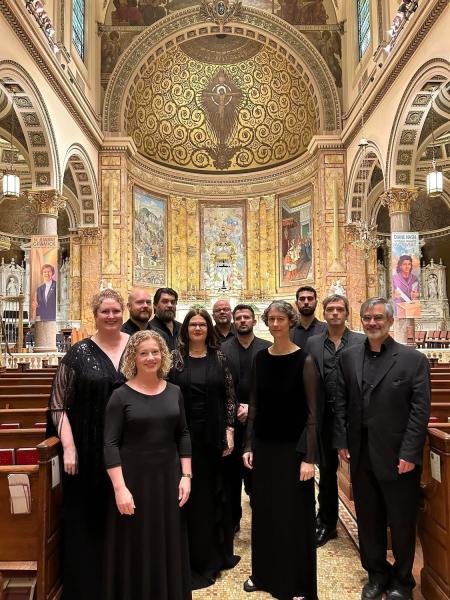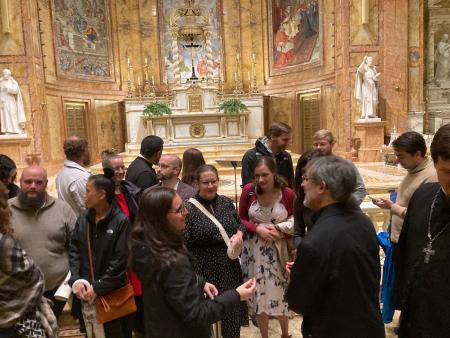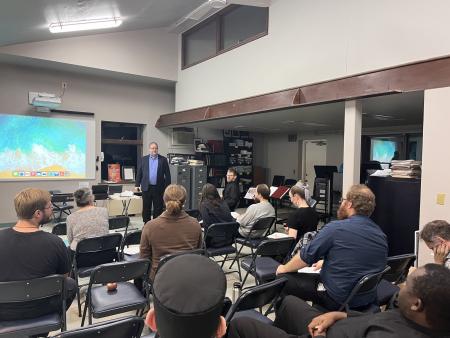Close to fifty St Vladimir’s Seminary faculty members, staff, students, and their family members were in attendance on Sunday, September 29, for a performance by the renowned choral ensemble, Cappella Romana, directed by Associate Director of the Institute of Sacred Arts and Professor of Music Dr Alexander Lingas. The program, “Lost Voices of Hagia Sophia,” featured medieval Byzantine chant from choristers at the Byzantine emperor’s cathedral. The concert took place at the majestic Church of St Ignatius Loyola in Manhattan, as part of their “Concerts at St. Ignatius” series. According to the St Ignatius Loyola website, “For a thousand years, Hagia Sophia was the largest domed interior in the world. Its stunning reverberation—of over 11 seconds—informs how this music is performed in the live acoustics of St Ignatius, which is, perhaps, only slightly less reverberant than Hagia Sophia!”

More than simply a musical performance, the evening was both an evocation of a sacred space and an experience that recalled the sonic and visual grandeur of Hagia Sophia in Constantinople. Constructed during the reign of Justinian I (527-65), Hagia Sophia famously had 60 priests, 100 deacons, over 100 readers, and 25 cantors in the 6th and 7th centuries. Dr Alexander Lingas drew on his extensive research of medieval Byzantine music to reconstruct a soundscape that facilitated the audience’s encounter with the ancient chants of Hagia Sophia.
Dr Peter Bouteneff, Professor of Dogmatic Theology, Kulik Professor of Sacred Arts, and Director of the Institute of Sacred Arts at St Vladimir’s Seminary, spoke of his admiration for the work of Cappella Romana, saying, “Cappella Romana is a very special ensemble, owing not only to their full, pristine sound but also to their unique repertoire. Nobody in the world does quite what they do. They bring together the brilliant vision of their artistic director and the profound skill of their singers.”
Thanks to the generosity of the SVOTS Board of Trustees, all seminarians, seminarian families, faculty, staff, and employees who attended the performance were given complimentary tickets.

As a follow-up to this landmark event, Director of Publications for Cappella Romana, Richard Barrett, visited St Vladimir’s Seminary later in the week to give a two-part workshop on Byzantine music, presenting his composition of the text and music for hymns for his patron saint, St Richard of Wessex. This presentation was open to the entire seminary community and was of special interest to seminarians studying Byzantine chant and those involved in the composition of sacred music. Seminarian Fr Josef Candelario (M.A. ‘24) took part in the workshops and remarked, “Everyone who attended was so engaged, and they had so many great questions for Richard. You could really tell that what he presented really set the creative ‘gears in motion.’ And I hope that it will come to fruition in the production of new liturgical compositions unto the glory of God!”

The workshops were part of a yearlong project at St Vladimir’s Seminary led by Dr Lingas aiming to encourage reflection and renewal relating to Eastern Orthodox liturgical singing in the Seminary Chapel of the Three Hierarchs. This program is made possible by a $25,000 Vital Worship, Vital Preaching Grant from the Calvin Institute of Christian Worship, Grand Rapids, Michigan, with funds provided by Lilly Endowment Inc.
During his time on campus, Richard helped chant the Small Paraklesis with the St Ambrose Society, praying for unborn children and abortion victims and their relatives. Richard, who also serves as Director of Music at Dormition Greek Orthodox Church in Somerville, MA, extended an invitation to the SVOTS Seminary Chorale to send a contingent to his parish on February 6–7, 2025 to help chant the All-night Vigil to St Richard.
Portions of this article were adapted from goarch.org and ignatius.nyc
About the Institute of Sacred Arts
The Institute of Sacred Arts at St Vladimir’s Seminary explores the intersection of human creativity and holiness.
Since its founding in 1938, St Vladimir’s Seminary has fostered the immersive study of the Liturgy, and of the visual, musical, and rhetorical arts. The Institute of Sacred Arts serves to extend the seminary’s mission in exploring the mutual relationship between theology and the arts by:
- Contributing to the work of people and institutions that practice and reflect on the sacred arts;
- Engaging people and institutions of all backgrounds with Orthodox Christian artistic tradition;
- Inspiring wider public interest in spirituality and the arts.
The Institute finds its expression in a curriculum infused with the arts; academic symposia and conferences; publications and cultural events.
St Vladimir’s Seminary is now offering an M.A. degree with a concentration in Sacred Arts. The concentration features coursework in both theoretical and applied theology and the arts, with opportunities to specialize in a particular discipline: music, iconology, art history, liturgy, architecture, et al. Numerous opportunities for in-depth study and creative collaboration with sacred arts scholars from a range of disciplines include subsidized internships and an annual artist-in-residence program.